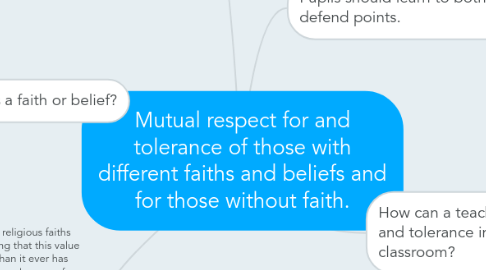Mutual respect for and tolerance of those with different faiths and beliefs and for those without faith.
作者:Jake Hawkings

1. The difference between tolerating and endorsing.
1.1. Tolerating, as stated in the British Values, links to the act of understanding and accepting something as being different.
1.2. Tolerating can also have very negative connotations, as if it were an act fulfilled by people despite not wanting to do. Why not use a term more fitting such as "accepting"?
1.3. Endorsing means to actually encourage the participation in something, as opposed to simply accepting it. Is forcing children to believe that British Values are the best values the most British thing to do?
2. Britain as a changing state.
2.1. Britain houses a larger mix of religious faiths than ever before, thus meaning that this value is even more prevalent now than it ever has been. Children have such a broad range of backgrounds, that it's vital that children accept one another regardless.
2.2. Britain's decline in religious faith also needs to be discussed with children, as children have every right to not follow a designated faith or belief, and should be able to declare themselves atheists if they so wish.
3. How important is a faith or belief?
3.1. Not only should respect be given for people with different faiths, but also to people who choose not to follow a religion. Condemnation of atheism is a very prevalent issue elsewhere in the world, and it's vital that children are aware that not following a faith is just as valid as following one.
3.2. Britain currently is home to more atheists than every before, and the number is continually growing over time. Children need to be made more aware that they can choose not to follow any faith or belief if they do not feel it is right for them.
4. Pupils should learn to both argue and defend points.
4.1. Whilst children must learn to understand that everyone has different values and thoughts, it's just as important that children are taught to understand that they don't have to always agree with one another, and that it's sometimes a good thing to disagree. Having different opinions is what makes us all unique, and there is no right or wrong answer.
4.2. Does stating that there is no right or wrong answer not go against the act of endorsing British Values rather than simply respecting them?
5. How can a teacher employ respect and tolerance in the everyday classroom?
5.1. Teachers must employ respect and tolerance in everything they do to help children understand the importance of it. It should not be limited to the one hour of RE they have a week, but should be drawn upon across the school's ethos.
5.2. Ensuring that no faith or belief is disrespected or degraded in any manner within the classroom can seem daunting, but it's important that children understand the importance of acceptance. One must show respect and tolerance for everyone on a daily basis out in the world, and children must be prepared from that within the classroom.


